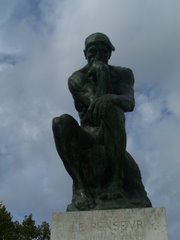Richard Rohr is a
Franciscan priest, who carries on the Christian Mystic tradition. He was deeply influenced by
Thomas Merton. In this book Rohr weaves
the story of Jesus and Christianity, the Greek Myths of the Hero’s journey, modern psychology, literature and even a connection with
Buddhism. It is a short easy to read book. The major
premise of the book is that we have two stages of life, and that we must
transcend the first stage to reach the second stage. That transcending may be leaving behind ideas
that we were raised with, as well as the search for our true self beyond the
rational thought. “We do what we are
called to do, and then try to let go of the consequences”. Words spoken by saints and madmen. I would contend we are responsible for the consequences
of our actions. The key from a Buddhist
perspective is not to become attached to the outcome for that causes suffering. That doesn’t mean we abdicate responsibility,
just our abdication of our longing for a hope for outcome. Rohr’s contention is
that suffering is the catalyst that moves us to spiritual growth. I think that suffering
can and often has moved others to grow and to transcend. However the struggle I have with Christian
versus Buddhist thought is that Buddhism accepts all of life is suffering and
offers a path to end suffering. Christianity and even in some ways Rohr, seems
to encourage actively engaging in suffering as the path to enlightenment. I
think Christians fell in love with the suffering Jesus I think this is a dangerous perspective. I am more easily able to relate to the heroes
journey, and returning home with new wisdom, or the Siddhartha leaving the
palace, experiencing suffering and searching for meaning, than I am to Jesus suffering
on the cross. . Rohr, uses this metaphorically, but we all know how many people
use this suffering metaphor as a reason to not transcend their environment of suffering.. Rohr actually does say “Failure and suffering are
the great equalizers and levelers among humans. …There is a strange and even
wonderful communion in real human pain, actually much more than in joy, which
is too often manufactured and and passing”
Yes, there is commonality in human pain, but that is different than
communion. We need to face our pain, recognize
our pain, and even embrace our pain.(I think Rohr would agree) But pain in and of itself is not a virtue.
Much of the book reads like a eastern religious guide to no-self, non-dualistic
way of being. (which is what we find in
the second part of our life). Sadly most of Christianity does not see the Jesus
story in that way. In fact, almost all of Christianity sees the Jesus story in
a pure dualistic way. Rohr tries to
point us to the farther shore, but I am still looking at his finger pointing to
it. I love the mystics, and the mystical tradition. But at some point you have
to come down from the mountain (out of the monastery) and be compassionate to
others, and engage with the others in the larger world to help others end their
own suffering. It is ok to be for
yourself, but as Rabbi Hillel says “if I am only for myself, who am I?” I think Rohr would agree with this. His is an
all inclusive message of God’s love for all people, and all creation and that
being in the second stage of our life leads us to eliminate the need to have barriers
between us. It’s a good book, not a great book. It didn’t move me tremendously.
It did remind me though to look at what are the issues that cause me to react
and to see where that is coming from. Always a good reminder. As
in Dante’s Divine Comedy, we are all Virgil, we are all Beatrice, guides through Hell and Heaven. We are all Odysseus
trying to find our way home. As T.S. Eliot wrote
“We shall not cease from exploration
And the end of all our exploring
Will be to arrive where we started
And know the place for the first time.”
And the end of all our exploring
Will be to arrive where we started
And know the place for the first time.”

No comments:
Post a Comment